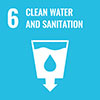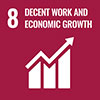Sustainability throughout the product’s lifecycle
We start with the Brundtland Report’s (1988) definition of the concept of sustainability to analyze key aspects and look at the essence of human nature. We realize that the way to meet people’s needs is key to optimizing their quality of life, integrating us back into nature and achieving the seventeen Sustainable Development Goals (SDG). The strategy that must be followed is the cooperation between the interested parties by bringing the places of residence, work and consumption closer to being able to have meeting spaces in the proximity of neighborhoods, but also within companies, public administrations and non-profit entities. Given that the purpose is to meet basic human needs in the consumer society we have built, we identify the quality of life indicators that allow us to analyze the sustainability of organizations and products throughout their lifecycle. The application of the quality of life indicators can be essential in our individual and collective decisions of everyday purchasing, both public and private, to raise awareness and to build a strong path towards sustainability. It will also help us design sustainable public policies, including public procurement.
ODS Quality of life indicators provide us with cross-sectional information on the degree of achievement of all 17 SDGs. However we can highlight:



 Montserrat Llobet Abizanda
Montserrat Llobet AbizandaCreator of the quality of life indicators on which the Citizens Q methodology is based (citizenship with quality of life) and, after more than fifteen years of research, founder, in 2019, of the Quality of life observatory, with the purpose of facilitating organizations the path to sustainability thanks to the use of this scientific methodology. Economist and PhD in Public Policies and Social Transformation (Autonomous University of Barcelona, UAB) and graduate in Environmental Management of Companies (Polytechnic University of Catalonia, UPC). She is a professor at Universitat Oberta de Catalunya (UOC) as a tutor for bachelor thesis and teaches the subject designed by her Cooperative and Collaborative Economics in the Sustainability and Social Responsibility master degree. She has been a professor of Corporate Social Responsibility in the degree of Business Administration and Management and the graduate degree in Social Economics at TecnoCampus Mataró-Meresme (UPF). She was also a high school teacher at four educational centers in the subjects of economics, finance, marketing, occupational safety and quality management, and a mentor of business traineeships. She has extensive professional experience in several fields, allowing her to have a rich multi-sector view of the business field, public administration and nonprofit entities: small trade, accounting, chemical transport, ethical banking, services in childhood and adolescence, to older people and people with mental health disorders, high school and college teaching, social and solidarity economy, agroecological consumption, tourist use housing (HUT), sustainable textile in Catalonia, energy communities and energy citizen communities, vulnerable groups, public procurement, and others.



